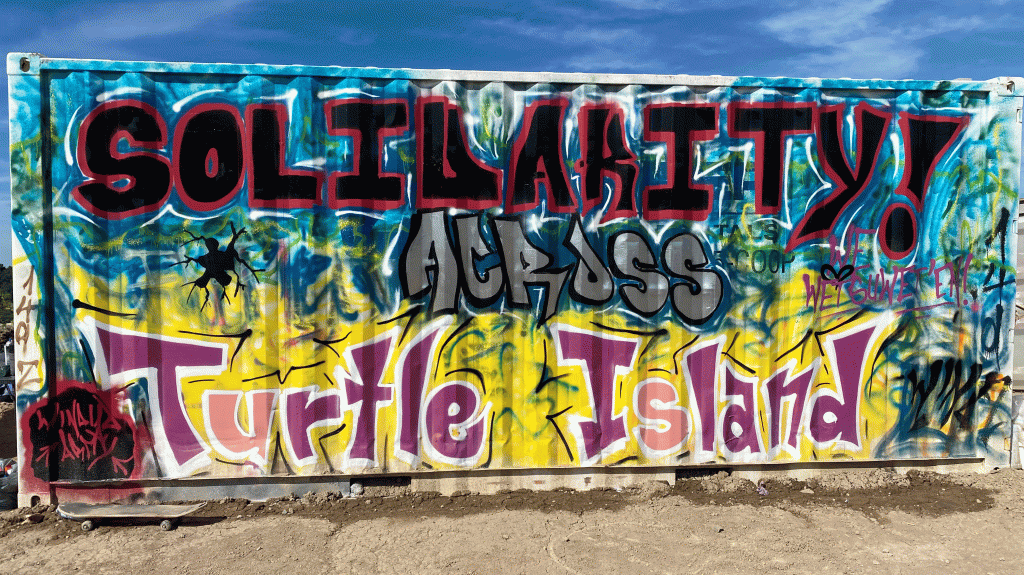
An OPP spokesperson estimated17 arrests had been made in total since police enforced an injunction on the 1492 Land Back Lane camp in early August. Photo: Brett Forester/APTN
A co-host of a weekly radio program along with a Ryerson University research fellow – whose work both focus on Indigenous issues – have been arrested in connection with the ongoing Haudenosaunee occupation of the McKenzie Meadows construction site in Caledonia, an hour south of Toronto.
Ontario Provincial Police (OPP) say One Dish, One Mic’s Karl Dockstader and Yellowhead Institute’s Courtney Skye were arrested on Sept. 2 and Sept. 3 respectively.
“Karl spent last week at 1492 Land Back Lane to do an immersive story for One Dish, One Mic as independent media,” said a statement posted to Twitter by the show’s other co-host Sean Vanderklis.
“He understood that as a journalist that as long as he didn’t actively assist the land defenders that his status as a journalist would protect his work.”
BREAKING NEWS:@KarlDockstader, the Cohost of @OneDishOneMic was arrested yesterday and formally charged by the OPP
His coverage of @1492LBL is what to his arrest.
We will be covering this story this Sunday on @610CKTB
For More Info, please refer to his press release: pic.twitter.com/D236B8gHTu
— Sean Vanderklis (@SeanVanderklis) September 3, 2020
Skye tweeted, “I was sitting on the banks of the Grand River with my auntie/sis. I was literally arrested within feet of our river in my homelands.”
https://twitter.com/MOHAWKEMOTIONS/status/1301645327984885767
On Thursday evening, OPP Const. Rodney LeClair estimated 17 people had been arrested in connection with the land reclamation camp and the blockades erected after police raided it.
That number stood at 13 on Thursday morning, LeClair said earlier. Police arrested nine people on Aug. 5 when OPP enforced a Superior Court injunction on the camp.
Another person was arrested in Hamilton on Aug. 24. Police arrested three more people on Sept. 2 (one in connection with the camp, another with the blockades). Details of the other arrests have not been released.
APTN News requested comment from the OPP regarding the Dockstader and Skye arrests but did not immediately hear back.
Shortly prior to announcement of these arrests, 1492 Land Back Lane spokesperson Skyler Williams told APTN the camp expects to be served with an amended injunction order Friday morning.
“The OPP just called and said that they were going to come and read the injunction – that there was some changes to it that happened at the last proceedings,” he said.
Memories of the initial raid remain fresh, and Williams said the mood around the camp was one of concern as they anticipate the morning.
“For us it is a peaceful occupation of our territory, and so to them to come and threaten violence again – because I think that’s what our people are taking those injunction readings as, is as a threat of violence – because we’ve been sitting here around the fire peacefully occupying our territory for the last 47 days now and have maintained the peaceful nature in which we started it.”
The camp was established July 19 after Foxgate Developments had begun construction on the McKenzie Meadows subdivision. Police say they fired a single rubber bullet during the Aug. 5 enforcement after people threw rocks at officers.
Camp occupants say the land was never ceded by the Haudenosaunee people. Foxgate maintains a Canadian Indian Agent lawfully sold the reserve lands in question to a private party in 1853, according to court documents.

Six Nations of the Grand River elected chief and council signed a “definitive agreement” to publicly support the development. However, the traditional Haudenosaunee Confederacy Chiefs Council says they never consented to the project and that it exists within a “red zone” against future development.
Two injunctions were extended in a Superior Court hearing on Aug. 25. Williams is named in one injunction that restrains anyone from occupying or hindering development of the construction site. It was issued initially on July 30, served the next day and has since been amended.
The other injunction was obtained by Haldimand County, where Caledonia is located, when the barricades were up on Aug. 7. It prevents anyone from blockading or restricting use of public roads in the municipality.
The last blockade was completely removed on Aug. 22, but Justice John Harper extended the injunction nevertheless.
“The barricades came down,” Williams added. “We made sure that even the entrance to the camp here has always been maintained as one of openness and for them to come in and threaten police violence yet again is disheartening to say the least.”
It’s local court sheriffs who enforce court ordered injunctions. Sworn affidavits submitted as evidence in court show that enforcement officers served past injunctions in the presence of both uniformed and plainclothes police officers by reading the orders, handing out copies and taping a copy to an orange and black pylon at the construction site entrance.
As a provincial government lawyer speaking on behalf of the OPP commissioner explained, if no one complies with the order, police take over.
“It’s far too typical that once the order’s been read out, there continues to be no compliance with the order. Sheriffs of course are limited in their ability to use force,” Christopher Diana told the court.
“The OPP then kind of take over carriage of the enforcement, and the obligation to enforce at that point, your honour, shifts from the sheriff’s office to the OPP.”
Once the amended order is served, that obligation will again be on police.
Police retain “significant discretion” in determining how and when they carry out that obligation, Diana added.










